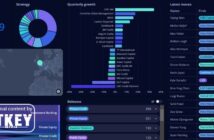- Estonian cyber security company BotGuard presents its Application Load Balancer
- It is a proprietary solution to confront ad fraud on web hosting provider level
- Application Load Balancer currently works only with Google Ads and collects feedback before expanding to other agencies
This March, the renowned Tallinn-based cybersecurity SaaS BotGuard announced the launch of its Application Load Balancer (ALB). It is the company’s proprietary load balancing solution that integrates ad fraud protection and bot threat mitigation on the web hosting provider level. The launch followed BotGuard’s EUR 12M Series A round.
BotGuard in Recap
BotGuard was founded in 2019 by Nikita Rozenberg (CEO) and Denis Prochko (CTO), two seasoned entrepreneurs with a combined experience of 50+ years in cyber security and banking software, as well as other verticals. As it happens most often, the idea of Bot Guard came from personal pain: as website owners, the two constantly had to battle malicious web traffic.
BotGuard’s technology enables fine-grained control for web hosting providers. It selectively blocks bad bot traffic in real time, while granting unrestricted access to human users, search engines, and affiliate bots. The technology uses AI-enabled automation to detect abnormal behavior, and the controls can be easily customized for the specific needs of each hosting provider and website owner.
The Problem of Bad Bots

Olga Voloshyna, Chairperson of the Committee on IT and Cyber Security of the German-Ukrainian Chamber of Industry and Commerce, CEO at Silvery LLC
According to Imperva’s 2024 Bad Bot Report, 49.6% of all internet traffic in 2023 wasn’t human, as human traffic levels decreased to 50.4% of all traffic. At that, almost one third of global traffic comes from ‘bad’ bots. That’s why the question of mitigating the bad bot threat and implementing reliable security measures becomes an immediate one.
‘Same as with any security system, the ultimate solution is to employ multi-level protection: both on the hosting provider level and on the organization level. Although hosting providers cannot employ a universally effective solution for confronting DDoS attacks for all their clients, load balancing systems can be quite beneficial on their side. This helps distribute incoming traffic between different servers in order to avoid the overloading of particular servers during a DDoS attack. Additionally, a provider can filter the traffic, for example, from known bot addresses, by countries of origin, etc.,’ Olga Voloshyna, Chairman of the Committee on IT and Cyber Security of the German-Ukrainian Chamber of Industry and Commerce, comments.
Wasted Ads

Nikita Rozenberg, Co-Founder and CEO at BotGuard
Digital advertising is a burgeoning industry that is vital to the economy. Mr Rozenberg cites the numbers: last year alone, digital ad spend surpassed USD 600B worldwide. An estimated USD 150B of that was stolen by digital ad fraudsters and bots, which equals USD 411M per day. By 2028, ad fraud is predicted to cost businesses USD 172B.
Wasted ad spend refers to the amount of money being wasted by misleading clicks and conversions from bots rather than real human leads, meaning a business won’t see any return on their ad investment. Although digital advertising is a huge and ever expanding industry, the problem of digital ad fraud has, until now, gone largely unchallenged.
‘The data highlights the need for a solution like ours – businesses simply can’t afford to keep throwing ad-spend down the drain. Our ALB protects against the kind of digital ad fraud that sees attempts from cybercriminals to defraud digital advertisers for financial gain by misrepresenting clicks, conversions or data events. This can come in many forms, from cybercriminals working alone or in a group, to large organizations attempting to thwart competitors by hijacking ad campaigns,’ Mr Rozenberg explains.
The Solution Against Ad Fraud
The newly presented BotGuard’s Application Load Balancer (ALB) is a secure load balancing solution that integrates ad fraud protection and bot threat mitigation, designed exclusively for hosting providers to protect customers. It’s an all-in-one product that filters web traffic and addresses the challenges hosting providers face in maintaining web application performance and security while increasing the performance of digital marketing campaigns.

Jason Haworth, CPO at BotGuard
More specifically, the solution combines HTTP load-balancing and high availability, SSL certificate management, dynamic object caching, bot threat mitigation, web application firewall, L7 DDoS protection, ad fraud protection, and HTTP/3 QUIC Protocol Support and compression with ad fraud and bot threat protection.
Application Load Balancer currently works with Google Ads, with plans to expand to other multi-channel platforms like Facebook and Amazon Ads. It also suits ad agencies seeking white-label capabilities.
According to BotGuard’s CPO Jason Haworth, the plan is to get feedback on ALB over the next few months and start expanding into channels by the end of this year.
‘With generative AI lowering the bar for hackers, we are looking at novel ways to protect AI/ML enabled services, such as ChatBots, to help customers protect and optimize their more costly resources. This requires a deep understanding of how services are both accessed and operated to ensure a high-quality user experience while providing customers with the protections needed to not let their costly AI/ML services become an exploitable vector for would-be attackers. Our experience with our own SaaS functions and system have provided us with a great sandbox to experiment with protecting these service tiers and, like all things BotGuard, we are committed to passing on our learnings to our customers,’ Mr Haworth concludes.

Kostiantyn is a freelance writer from Crimea but based in Lviv. He loves writing about IT and high tech because those topics are always upbeat and he’s an inherent optimist!





